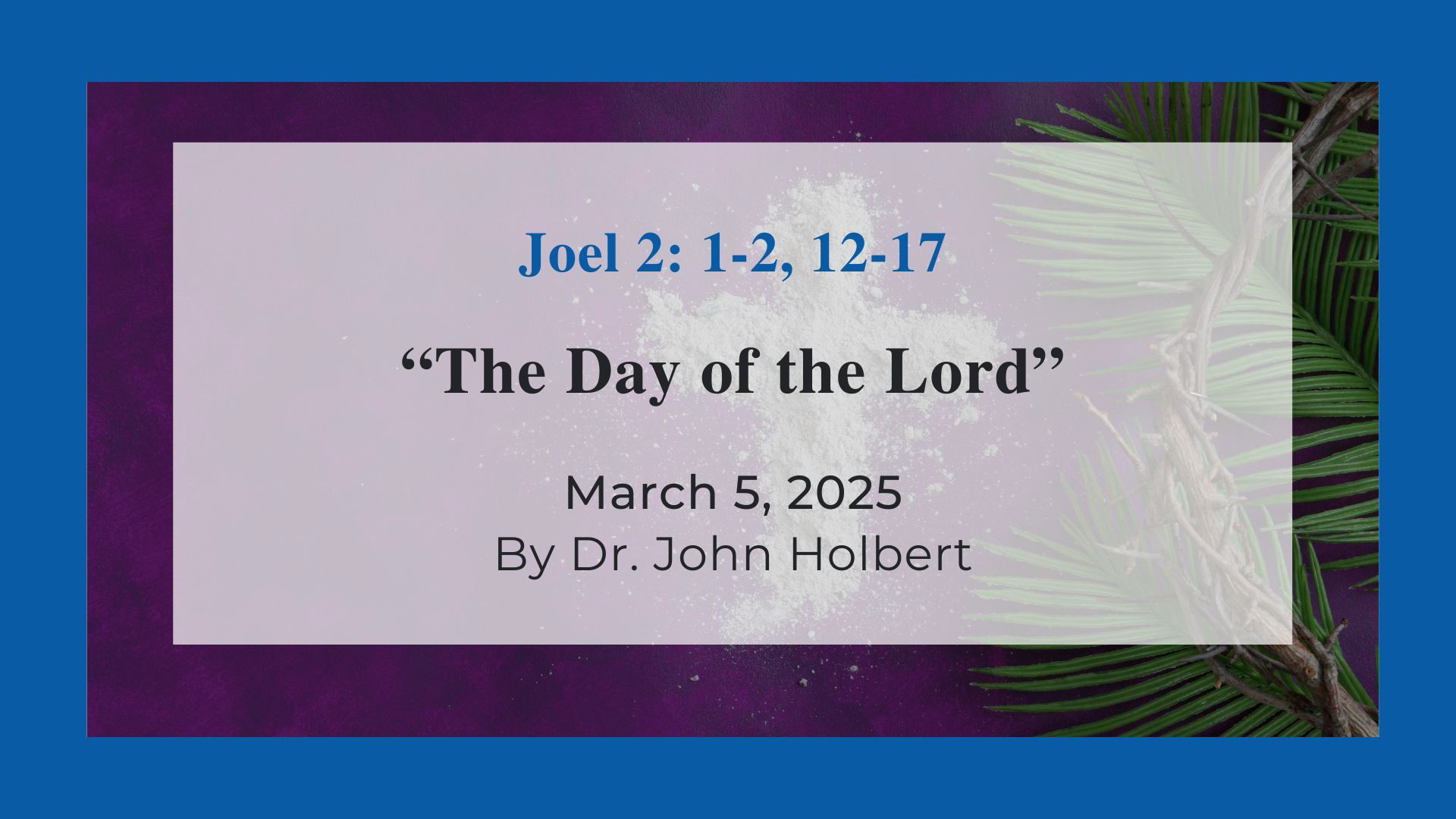The Day of the Lord - Reflections on Joel 2:1-2, 12-17, Ash Wednesday, Year C
by John C. Holbert on Saturday, February 1, 2025

Ash Wednesday ushers in the season of Lent, that time when our faith lives are focused on introspection, a close look at the ways we are living our lives in the glaring light of God’s call and demand. Every time I shuffle forward to receive that cross of ashes on my ever-expanding forehead (my hair has long ago lost its battle and is in a rapid retreat), I think of my mortality, how I have fulfilled or not fulfilled the desires of my God, and how I face the necessary end of those days. At 78, that end is fast approaching; my Ash Wednesday worshipping will sooner rather than later be over. All of that reflection, which I do not find gloomy, merely practical and necessary, is made in the face of Joel’s stark portrait of the day of YHWH.
The day of YHWH is a well-known and frequently mentioned reality in the Hebrew Bible. Most especially the prophets were fixated on its coming. Perhaps most famously and ominously, Amos, that 8th century BCE purveyor of sharp warnings and dire omens for the people of northern Israel, announces in 5:18-20 the following:
Alas for you who look forward to the day of YHWH!
Why do you want the day of YHWH?
It is darkness, not light,
as if someone fled a lion and met a bear;
or went into a house, put a hand on a wall,
and was bitten by a snake!
Is not the day of YHWH darkness, not light,
gloom with no brightness in it?
The implications of Amos’ portrayal of the day of YHWH are clear: many imagine YHWH’s coming as a time of joy and promise, an occasion of YHWH’s approbation of the chosen people, a celebration of YHWH’s great pleasure in the people of the promise. Not so, shouts Amos! When YHWH comes, anger will crease YHWH’s brow, fury will be YHWH’s central emotion, rage will burn against a people who have fallen far short of YHWH’s expectations. Amos follows this horrifying portrait with that famous rejection scene of all of Israel’s supposed beautiful worship of their God, saying to them that their feasts and gatherings, their sacrifices and songs are only repulsive to a God who demands from them justice and righteousness rather than meticulous and empty worship.
Joel is little different in tone. Exactly when the book of Joel was composed, and exactly how its unity or lack thereof is to be adjudicated, is the stuff of doctoral dissertations and near-endless academic debate. The bulk of scholars now assign the book to post-exilic times, perhaps as late as the 5th or 4th century. If so, that means that the dire warnings of Amos, some 300 years earlier, have not lost their power and influence. Hear the opening salvo of Joel’s doom-laden language (2:1-2):
Blow the trumpet in Zion;
sound an alarm on my holy mountain!
Let all the inhabitants of the land tremble,
for the day of YHWH is coming, it is close—
A day of darkness and gloom,
a day of clouds and thick darkness!
Like blackness spread over the mountains
a great and powerful army comes;
their like has never been
nor will ever be again in ages to come!
Joel refers here to his overriding metaphor of a plague of locusts, that all-too-common occurrence in the ancient Near East when a usual experience of grasshoppers, generally placidly clacking through the fields of grain, suddenly, and for still-unexplained reasons, are transformed into a vast cloud of devouring locusts, eating through the land without ceasing until no blade of grass remains. That is the army Joel sees coming on the day of YHWH, and whether he means it literally or figuratively, no person will be at all glad to see the arrival of the day of YHWH.
But just how does all that relate to those of us about to receive the ashes of our certain mortality on this precipice of Lent? God is not to be trivialized nor made small as we face both that God and ourselves. The day of YHWH, the time of God’s coming, is not always a pleasant and pleasurable thing. God may come in darkness and gloom, with a demanding mien. So, when Joel goes on to say, “Return to me with all your heart, with fasting, weeping, and mourning; rend your hearts and not your clothing” (2:12-13), he implies that there is far more to be done than receive our ashen gift and rush out to wash it off, lest we embarrass ourselves among our friends. We may indeed need “fasting and weeping and mourning” in the confrontation with this God who comes not always to affirm us in all we have done, but comes on this day to confront and demand more from us than we often expect. If Joel and Amos are to be taken seriously, God is ever concerned with our betterment, our conversion, our turning toward God. That may well be what the Lent to come is finally all about.
